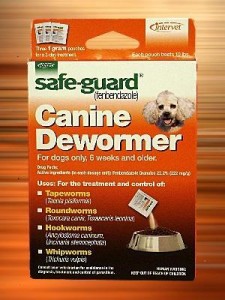 Your dog appears to have worms! Yikes!
Your dog appears to have worms! Yikes!
Question #1:
What type of worms are they?
You may not be able to take your dog to the vet at this point in time but you want to give your dog some type of medication to get rid of the worms. Without a vet to examine the worms, you may have a hard time determining the exact type whether it is roundworm, tapeworm, whipworm or hookworm.
Whipworms and hookworms are difficult to diagnose because with whipworms they produce very few eggs and you might not see them in the stool and hookworms are usually not passed in the stool so a fecal exam is necessary.
Roundworms are the most common and are generally 2-4 inches long, tan or white and “spaghetti-like” creatures with tapered ends. Tapeworm segments are usually ¼ – ½ inches long. When tapeworm segments dry out, they tend to look like a grain of uncooked rice or a sesame seed. At least you have a visual with these 2 types of worms!
Question #2:
What type of symptoms does your dog seem to exhibit?
If vomiting and diarrhea are the main symptoms, look for the roundworms in the stool and tapeworms can be found in the dried stage around your dog’s bedding or wherever they sleep. (Unless you are lucky enough to actually see the worms crawling out of your dog which is really an unpleasant experience, you will need to find them in other places!)
Whipworms, which live in the dog’s small intestine, suck the dog’s blood. A dog’s reaction is usually mild with whipworms unless the infestation is large; then the symptoms are diarrhea, weight loss and blood loss. Hookworm symptoms include itchy feet, a rash on the dog’s feet, wheezing and coughing, diarrhea, abdominal cramps, nausea and blood in stool or black stool.
Question #3
 Is there a product that I can give my dog that will take care of all of the worms just to be on the safe side?
Is there a product that I can give my dog that will take care of all of the worms just to be on the safe side?
Yes, there are products that will take care of all worms if you can’t tell exactly what kind of worms your dog has and they are easy to administer. For example, Safe-guard Canine De-Wormer, which kills roundworms, tapeworms, whipworms and hookworms, comes in 3 different sizes and uses fenbendazole as the active ingredient. Tapeworms take a blood meal one time every three days so that is why it is administered for a three-day period.
Our rule of thumb for dog worm control is to do so quarterly for roundworms and twice a year for all worms. Be safe and keep your dogs healthy without the fear of worms creeping in without you knowing it!

jenniferlawrance says
Cloves spices can do wonders in treating parasites in both dogs and humans. They exhibit anti-parasitic properties to kill the internal worms. More Info: